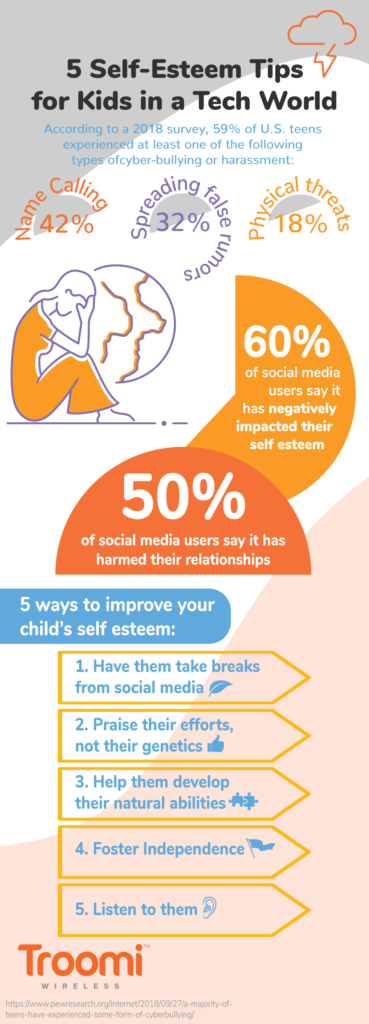
We all have physical insecurities at times. When we look in the mirror we might think “I wish I were more toned” or “I wish my nose was a different shape.” Society has trained us to look for these imperfections by constantly feeding us photoshopped perfection and unrealistic body standards. If these societal expectations are affecting us so negatively, what are they doing to our kids—especially our preteens and teens? You’ve likely seen your son or daughter obsessing over how they look in a photo or becoming overly concerned with exercise—these might be signs that your child is struggling with negative body image.
Let’s take a look at a few other signs your child might exhibit if they struggle with negative body image or lack of self worth and some tips for teaching self-esteem.
Signs Your Child Struggles With Negative Body Image
You might think some of these signs are just part of growing up, but they’re important to pay attention to as parents. In severe cases, negative body image can contribute to mental illness or eating disorders.
Frequent Comparison
We all compare ourselves to each other—it’s a part of human nature. But if you begin to notice your child constantly comparing themselves to others or making quick judgments of other people, they might be struggling with a lack of self worth. If your child frequently compares themselves to others, they’ll feel as though they’ll never be good enough, fit enough, or pretty enough. Comparison also discourages individuality, making your child feel like they need to fit a certain mold rather than loving themselves for who they are. Constant comparison can also lead to negative feelings like envy, guilt, and defensiveness.
Obsession Over Diet or Exercise
Living a healthy lifestyle is something that you should encourage in your kids. However if you notice them becoming overly concerned with what they’re eating or how much exercise they’re doing, it might be time to talk with them. Few young kids need to diet, so if your child starts talking about going on a diet or saying they’re “fat”, that’s a sign they’re probably struggling with negative body image.
Negative Self Talk
When your child looks in the mirror, do they only see their imperfections? Maybe they frequently make comments about how “ugly” their nose or ears are. Or they might fish for compliments about their appearance. Pay attention when you start noticing these comments—they are possibly a sign of a lack of self worth in your child.
Obsession Over Appearance
Everyone likes to look good in pictures or have a cute outfit, but there’s a point where it becomes too much of a focus. If your child is constantly trying to get the perfect angle in a photo or insists that you retake a casual family photo because they didn’t “look good” they might be starting to obsess over their appearance. Similarly, they might take far longer than needed to get ready and insist that all of their clothes are ugly.
What to Do if Your Child Struggles With Negative Body Image
It’s important to help build your kids’ self-esteem, especially if you notice signs that they might be struggling with negative body image or lack of self worth. Here are a few tips for teaching self-esteem you can use with your children (whether they are currently struggling or not).
Don’t Speak Negatively About Yourself
As you know, kids learn by example. If you are constantly commenting on your own appearance or weight, chances are, your kids will focus on those things too. Consider doing positive self-talk exercises and include your child too. This will help both of you see your bodies in a different, positive way.
Don’t Speak Negatively About Your Child
Speaking negatively about your child’s appearance is one of the most damaging things you can do. As a parent, you should always build your kids’ self-esteem. Though you might be joking, your child might still internalize what you said and begin to think it’s true. Make sure your home and family is the safest space possible for your children. And be sure to correct any mean comments said by siblings as well. Just like you taught your child how to talk and walk, you also teach them how to see themselves. If you make occasional negative comments about their appearance—especially about something they can’t change (a facial feature vs an outfit)—you are teaching them to look at themselves in the same way. Instead, focus on giving your child words of affirmation
Focus on Living a Healthy Lifestyle to Feel Good
If you’re constantly going on diets and exercising just to look better, you’re giving your child the wrong idea about healthy living. Teach your children to eat healthy and exercise because it makes them feel good mentally, emotionally, and physically. Keep your family active—enjoy the outdoors together and get your children involved in physical activities they enjoy. If your children start to appreciate their body for what it can do, they might stop focusing so much on its appearance alone.
Limit Social Media Use
It’s no secret that social media usage is a major cause of social comparison for all of us. How can you help but compare your pictures to the seemingly perfect pictures your friends post on social media? Kids frequently fall victim to this comparison, especially with the extra pressure of cyberbullying. Limit the time your child spends on social media to help them avoid negative influences that create a lack of self worth. Or even check out Troomi for a phone with no social media that can also help keep your child safe.
Even if your child doesn’t seem to struggle with body image, it’s always a good idea to start teaching self-esteem when they’re young so they’re prepared for what society throws at them. And always keep an eye out for signs that your child is struggling with negative body image or lack of self worth. If you catch the signs, you can help your child develop a positive body image and avoid developing serious health challenges like body dysmorphia or eating disorders.

